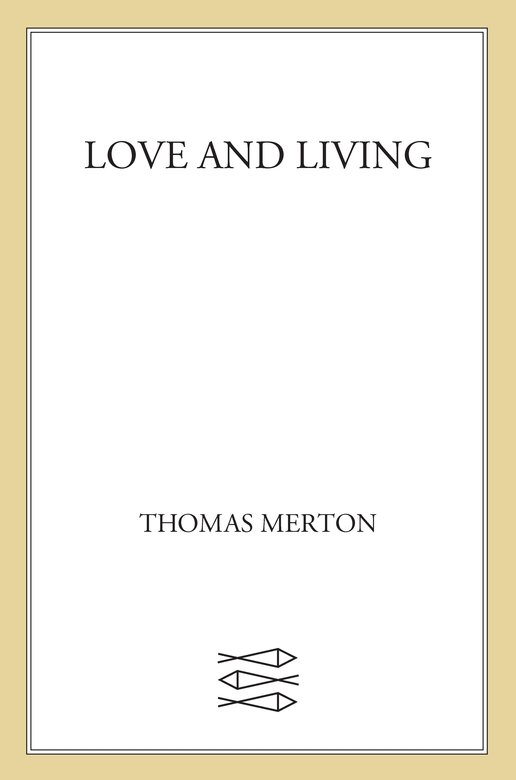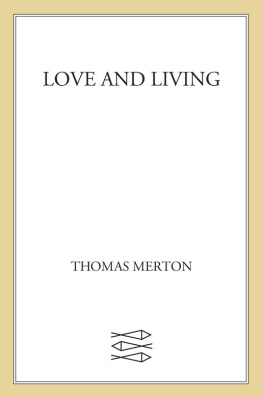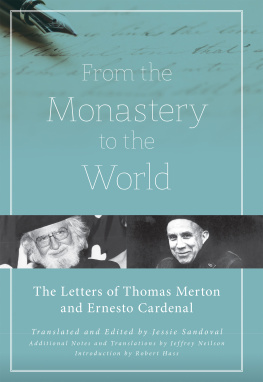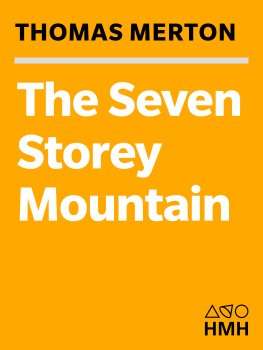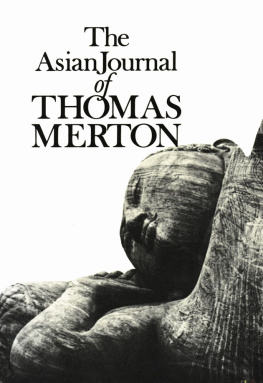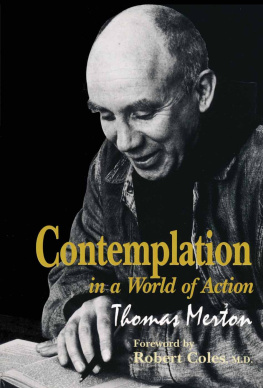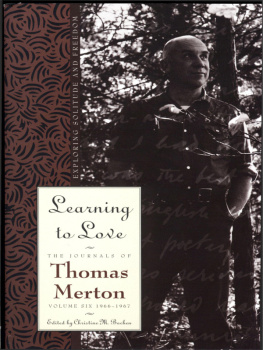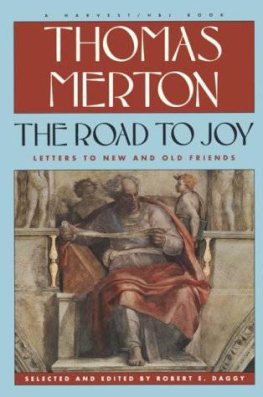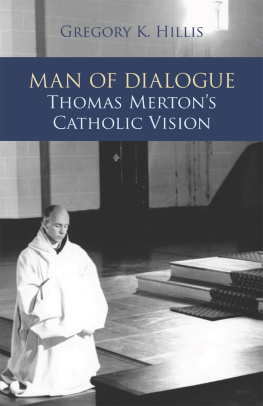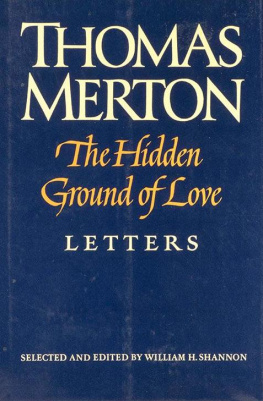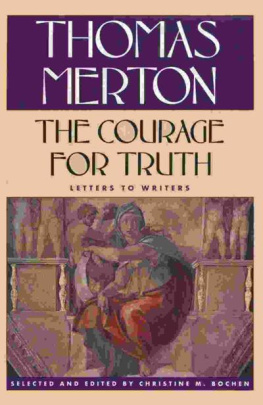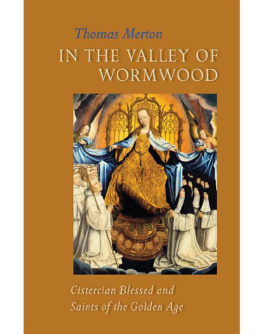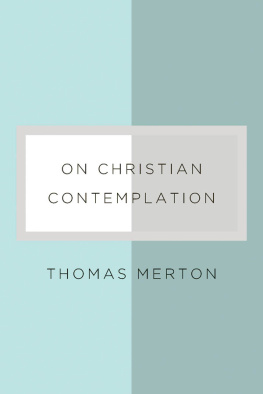Grateful acknowledgment is made to the editors and publishers of the following journals, in which some of these essays first appeared, although in considerably different form: America, The Baptist Student, The Bible Today, Cistercian Studies, Commonweal, The Cord, The Critic, The Mediaator, and Spiritual Life . Learning to Live was first published as a chapter in University on the Heights, edited by Wesley First (Doubleday, 1969), and Symbolism: Communication or Communion? was included in New Directions Annual 20 (1968). Two of the Seven Words in part two of this volume first appeared in Prophetic Voices, edited by Ned OGorman, and published by Random House (1969). They are all reprinted here with permission of the publishers. Christian Humanism in the Nuclear Age, although unpublished in the United States, was originally published in Redeeming the Times (the title under which Seeds of Destruction appeared in England).
Life consists in learning to live on ones own, spontaneous, freewheeling: to do this one must recognize what is ones ownbe familiar and at home with oneself. This means basically learning who one is, and learning what one has to offer to the contemporary world, and then learning how to make that offering valid.
The purpose of education is to show a person how to define himself authentically and spontaneously in relation to his worldnot to impose a prefabricated definition of the world, still less an arbitrary definition of the individual himself. The world is made up of the people who are fully alive in it: that is, of the people who can be themselves in it and can enter into a living and fruitful relationship with each other in it. The world is, therefore, more real in proportion as the people in it are able to be more fully and more humanly alive: that is to say, better able to make a lucid and conscious use of their freedom. Basically, this freedom must consist first of all in the capacity to choose their own lives, to find themselves on the deepest possible level. A superficial freedom to wander aimlessly here or there, to taste this or that, to make a choice of distractions (in Pascals sense) is simply a sham. It claims to be a freedom of choice when it has evaded the basic taskof discovering who it is that chooses. It is not free because it is unwilling to face the risk of self-discovery.
The function of a university is, then, first of all to help the student to discover himself: to recognize himself, and to identify who it is that chooses.
This description will be recognized at once as unconventional and, in fact, monastic. To put it in even more outrageous terms, the function of the university is to help men and women save their souls and, in so doing, to save their society: from what? From the hell of meaninglessness, of obsession, of complex artifice, of systematic lying, of criminal evasions and neglects, of self-destructive futilities.
It will be evident from my context that the business of saving ones soul means more than taking an imaginary object, a soul, and entrusting it to some institutional bank for deposit until it is recovered with interest in heaven.
Speaking as a Christian existentialist, I mean by soul not simply the Aristotelian essential form but the mature personal identity, the creative fruit of an authentic and lucid search, the self that is found after other partial and exterior selves have been discarded as masks.
This metaphor must not mislead: this inner identity is not found as an object, but is the very self that finds. It is lost when it forgets to find, when it does not know how to seek, or when it seeks itself as an object. (Such a search is futile and self-contradictory.) Hence the paradox that it finds best when it stops seeking: and the graduate level of learning is when one learns to sit still and be what one has become, which is what one does not know and does not need to know. In the language of Sufism, the end of the ascetic life is Rida, satisfaction. Debts are paid (and they were largely imaginary). One no longer seeks something else. One no longer seeks to be told by another who one is. One no longer demands reassurance. But there is the whole infinite depth of what is remaining to be revealed. And it is not revealed to those who seek it from others.
Education in this sense means more than learning; and for such education, one is awarded no degree. One graduates by rising from the dead. Learning to be oneself means, therefore, learning to die in order to live. It means discovering in the ground of ones being a self which is ultimate and indestructible, which not only survives the destruction of all other more superficial selves but finds its identity affirmed and clarified by their destruction.
The inmost self is naked. Nakedness is not socially acceptable except in certain crude forms which can be commercialized without any effort of imagination (topless waitresses) . Curiously, this cult of bodily nakedness is a veil and a distraction, a communion in futility, where all identities get lost in their nerve endings. Everybody claims to like it. Yet no one is really happy with it. It makes money.
Spiritual nakedness, on the other hand, is far too stark to be useful. It strips life down to the root where life and death are equal, and this is what nobody likes to look at. But it is where freedom really begins: the freedom that cannot be guaranteed by the death of somebody else. The point where you become free not to kill, not to exploit, not to destroy, not to compete, because you are no longer afraid of death or the devil or poverty or failure. If you discover this nakedness, youd better keep it private. People dont like it. But can you keep it private? Once you are exposed Society continues to do you the service of keeping you in disguises, not for your comfort, but for its own. It is quite willing to strip you of this or that outer skin (a stripping which is a normal ritual and which everybody enjoys). The final metaphysical stripping goes too far, unless you happen to be in Auschwitz.
If I say this description is monastic, I do not necessarily mean theological. The terms in which it has been statedhere are open to interpretation on several levels: theologically, ascetically, liturgically, psychologically. Lets assume that this last is the more acceptable level for most readers. And lets assume that I am simply speaking from experience as one who, from a French lycee and an English public school, has traveled through various places of learning and has, in these, learned one thing above all: to keep on going. I have described the itinerary elsewhere, After which I went to be a novice in a Trappist monastery, where I also learned just enough theology to renounce all desire to be a theologian. Here also (for I am still in Kentucky) I learned by teaching: not theology as such, but the more hazardous and less charted business of monastic education, which deals with the whole person in a situation of considerable ambiguity and hazard: the novice, the young monk who wants to become a contemplative and who is (you sooner or later discover) trapped both by the institution and by his own character in a situation where what he desperately wants beyond all else on earth will probably turn out to be impossible. Perhaps I would have been safer back at Columbia teaching elementary English composition. Fortunately, I am no longer teaching anybody anything.
